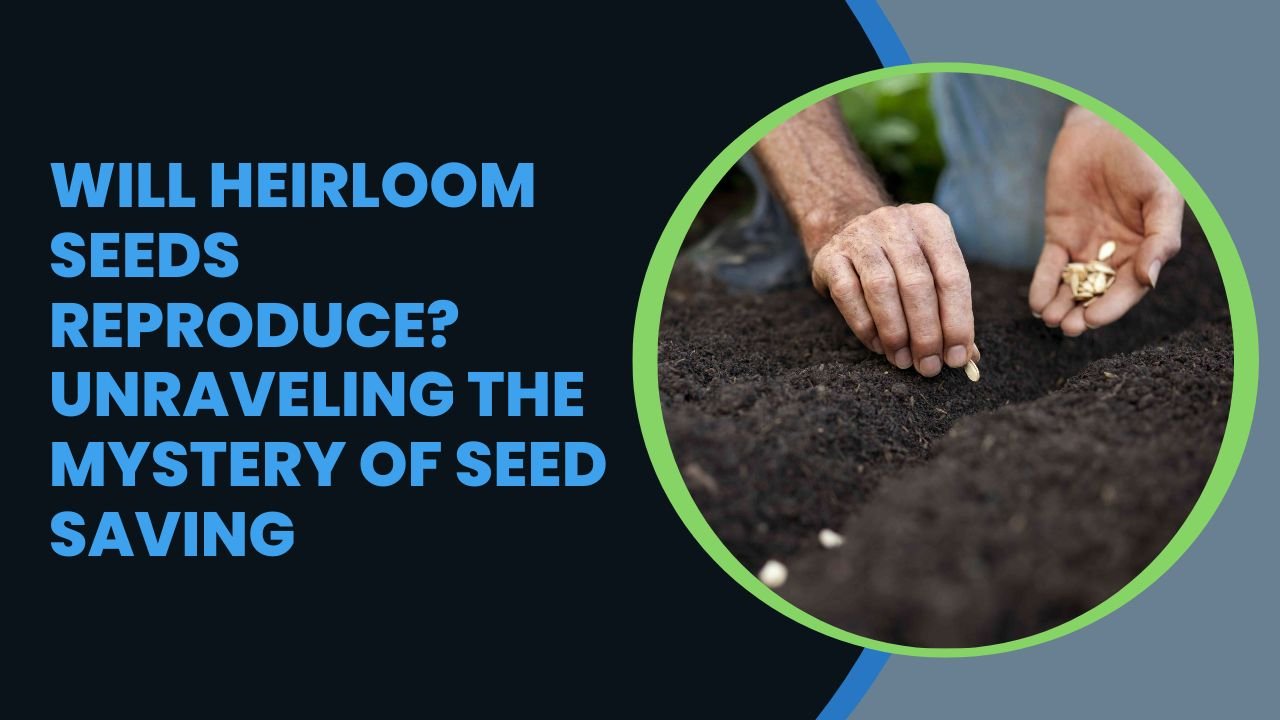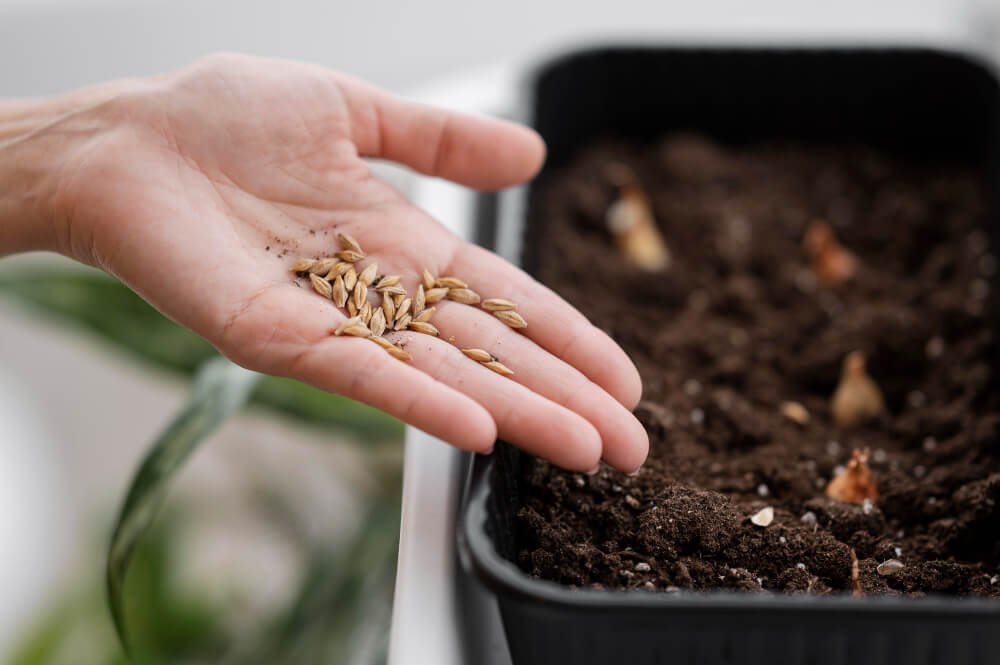
Seeds are extraordinary vessels of life, encapsulating the potential to grow into beautiful plants, bear fruit, and yield new seeds. Among the various types of seeds available, heirloom seeds hold a special place due to their rich history, unique characteristics, and ability to be saved for future plantings.
Many gardeners and agricultural enthusiasts wonder: Will heirloom seeds reproduce? This article aims to demystify the process of seed saving and shed light on the factors that affect the reproduction of heirloom seeds.
What are Heirloom Seeds?
Heirloom seeds are open-pollinated varieties that have been carefully cultivated and passed down through generations. These seeds often have a long history, dating back at least 50 years, and are known for their unique traits, flavors, and adaptability. They are treasured for their ability to produce plants that stay true to their parent plants, maintaining their distinct characteristics.
Read Also: Fast-Growing Delights: Discovering Quick-Growing Vegetable Seeds
The Importance of Seed Saving
Seed saving is an ancient practice that has played a crucial role in the development of agriculture. It allows gardeners and farmers to collect and store seeds from their best-performing plants, ensuring a continuous supply of seeds for future plantings. Seed saving also contributes to the preservation of genetic diversity, which is vital for adapting to changing environmental conditions and combating the loss of plant varieties.
The Process of Seed Saving
To successfully save and reproduce heirloom seeds, a systematic approach is essential. The following steps outline the key aspects of the seed-saving process:
Selecting the Right Heirloom Seeds
Choosing suitable heirloom seeds is the first step towards successful seed saving. Gardeners should select plants that exhibit desirable traits, such as flavor, color, disease resistance, or unique characteristics specific to a particular variety. This careful selection ensures the preservation of those desired traits in subsequent generations.
Read Also: Starting Strong: Which Vegetable Seeds to Start Indoors
Planting and Growing Heirloom Seeds
Once the appropriate heirloom seeds are chosen, it’s time to plant and nurture them. Providing optimal growing conditions, including proper soil preparation, adequate watering, and sufficient sunlight, encourages healthy plant development and maximizes the chances of seed reproduction.
Pollination and Isolation Techniques
Heirloom seeds reproduce through natural pollination methods. However, to prevent cross-pollination from other varieties, isolation techniques can be employed. This involves creating physical barriers or implementing timed planting to separate different varieties and maintain the purity of the seeds.
Harvesting and Storing Heirloom Seeds
When the plants have matured and the fruits or flowers have developed, it’s time for seed harvesting. Each plant may have different requirements for seed extraction. Generally, the seeds should be allowed to fully ripen, and then they can be carefully collected, cleaned, and dried before storage in suitable containers.
Read Also: Pre-Planting Prep: Soaking Vegetable Seeds for Optimal Results
Factors Affecting Seed Reproduction

The successful reproduction of heirloom seeds can be influenced by several factors, including:
Cross-Pollination
Heirloom seeds are susceptible to cross-pollination from other plant varieties, including hybrids and GMOs. Cross-pollination can result in the loss of genetic purity and traits unique to the desired heirloom variety. Understanding the distance required for isolation and the pollination behaviors of different plants is crucial to avoid unwanted cross-pollination.
Genetic Integrity
Maintaining the genetic integrity of heirloom seeds is essential for preserving their unique characteristics. If heirloom plants cross-pollinate with other varieties, the resulting seeds may exhibit different traits or even revert to characteristics of previous generations. Vigilance in preventing unintended pollination is necessary for maintaining genetic purity.
Environmental Conditions
Environmental factors, such as temperature, humidity, and soil quality, can significantly impact seed reproduction. Optimal growing conditions provide the best chances for successful seed development. Extreme weather events, pest infestations, or diseases can affect seed quality and viability.
Read Also: Shedding Light on Germination: Which Vegetable Seeds Need Light?
Ensuring Successful Seed Reproduction
To ensure the successful reproduction of heirloom seeds, gardeners can employ various strategies and practices, including:
Seed Viability Testing
Before planting saved seeds, conducting viability tests can determine their germination rates. This helps assess the seed’s health and viability, ensuring a higher probability of successful germination and plant growth.
Maintaining Genetic Diversity
Preserving genetic diversity is crucial for the long-term viability and adaptability of heirloom seeds. Rotating crops, growing multiple varieties, and participating in seed exchanges or seed-saving communities can help maintain a diverse gene pool and prevent inbreeding depression.
Benefits of Heirloom Seed Reproduction
The reproduction of heirloom seeds offers several benefits:
- Preservation of Heritage: Heirloom seeds carry historical and cultural significance, allowing gardeners to cultivate plants that have stood the test of time.
- Genetic Diversity: By saving and reproducing heirloom seeds, gardeners contribute to the conservation of plant diversity and help prevent the loss of unique varieties.
- Self-Sufficiency: Growing plants from saved seeds empowers individuals to become more self-reliant and less dependent on commercial seed suppliers.
Read Also: Exploring Cross-Pollination: The Journey of Heirloom Seeds
Common Challenges and Troubleshooting
While seed saving can be a rewarding endeavor, gardeners may encounter challenges along the way. Some common issues include:
Cross-Pollination Issues
Preventing cross-pollination can be challenging, especially in small gardens or areas with a high concentration of other plant varieties. Implementing isolation techniques and understanding the pollination behaviors of different plants can help mitigate this issue.
Contamination from GMOs
The spread of genetically modified organisms poses a risk to heirloom seed purity. To minimize the risk of contamination, it’s essential to source heirloom seeds from reputable suppliers and maintain isolation distances from GMO crops.
Seed Storage Problems
Improper seed storage can lead to reduced seed viability and deterioration. Seeds should be stored in cool, dry, and airtight containers to maintain their quality and prolong their shelf life.
Read Also: Maximizing Growth: Do Vegetable Seeds Grow Through Mulch?
Read Also: Planting Organic Herb Seeds: Enhancing Flavor and Health in Your Garden
Read Also: Burpee Organic Seeds: Your Go-To for Successful Gardening
Read Also: Organic Seeds for Hydroponic Gardening: A Green Thumb’s Choice
Conclusion
In conclusion, heirloom seeds can reproduce if proper seed-saving techniques are employed. By carefully selecting, growing, pollinating, and storing heirloom seeds, gardeners can enjoy the rewards of preserving plant diversity, maintaining genetic integrity, and ensuring a sustainable supply of seeds for future generations.
Frequently Asked Questions (FAQs)
Can I save seeds from hybrid plants?
Yes, you can save seeds from hybrid plants, but the resulting plants may not exhibit the same characteristics as the parent hybrid plant. It’s recommended to save seeds from open-pollinated varieties or heirloom plants for consistent results.
How long can heirloom seeds be stored?
Under proper storage conditions, heirloom seeds can remain viable for several years. Some seeds, such as tomatoes and peppers, can remain viable for up to five years or more, while others, like onions or leeks, have shorter viability periods of one to two years.
Do heirloom seeds require special care for germination?
Heirloom seeds generally have similar germination requirements as other seeds. Providing adequate moisture, temperature, and light conditions specified for each plant variety will support successful germination.
